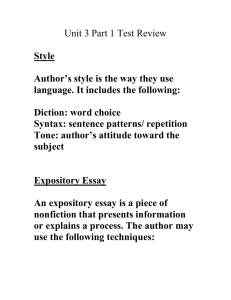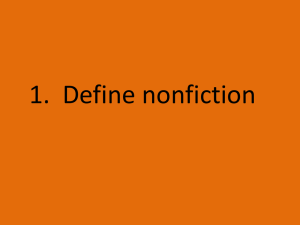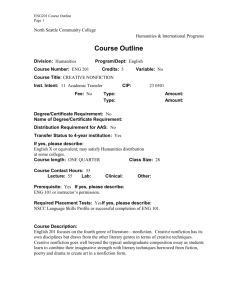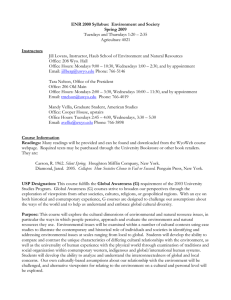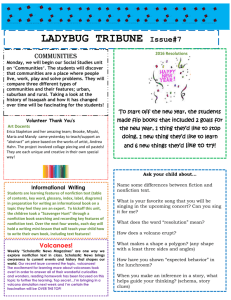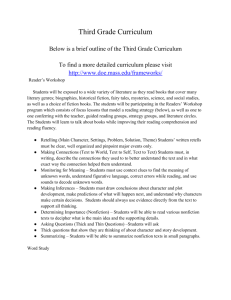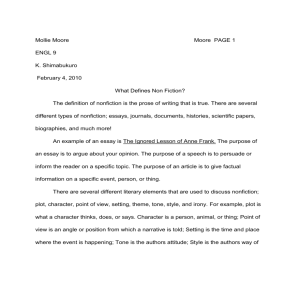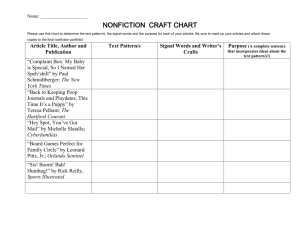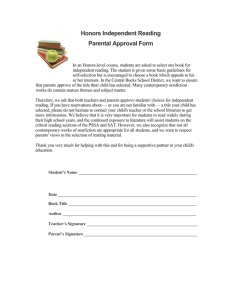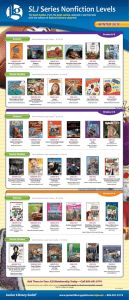ENR 1100 * Interdisciplinary Environmental Problem Solving
advertisement
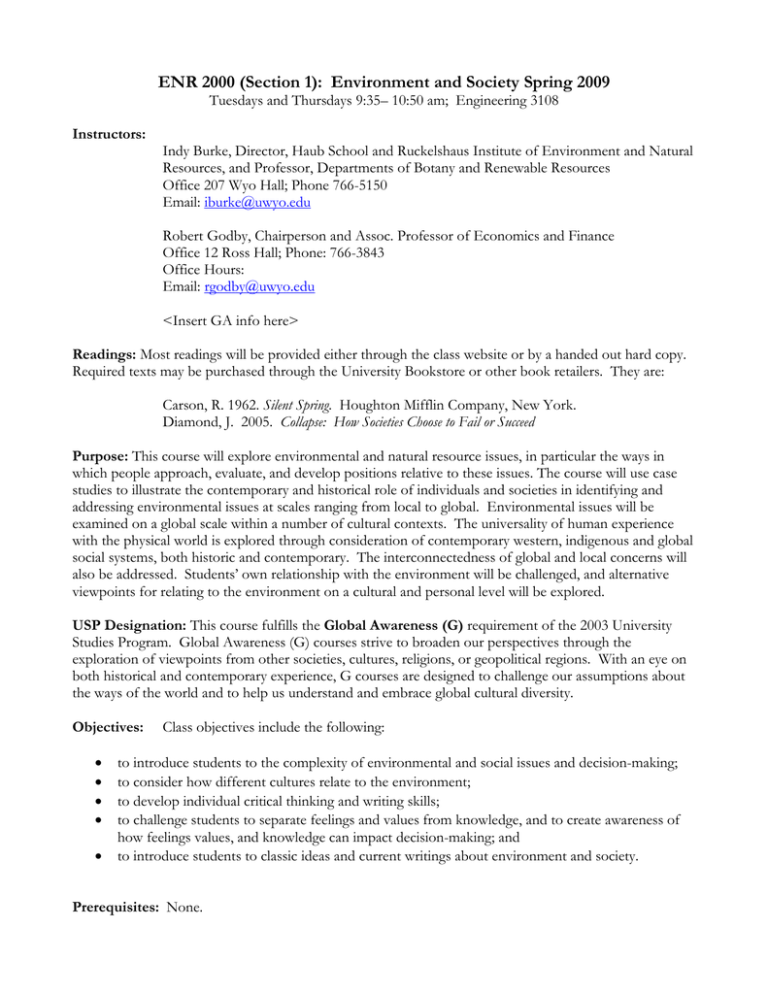
ENR 2000 (Section 1): Environment and Society Spring 2009 Tuesdays and Thursdays 9:35– 10:50 am; Engineering 3108 Instructors: Indy Burke, Director, Haub School and Ruckelshaus Institute of Environment and Natural Resources, and Professor, Departments of Botany and Renewable Resources Office 207 Wyo Hall; Phone 766-5150 Email: iburke@uwyo.edu Robert Godby, Chairperson and Assoc. Professor of Economics and Finance Office 12 Ross Hall; Phone: 766-3843 Office Hours: Email: rgodby@uwyo.edu <Insert GA info here> Readings: Most readings will be provided either through the class website or by a handed out hard copy. Required texts may be purchased through the University Bookstore or other book retailers. They are: Carson, R. 1962. Silent Spring. Houghton Mifflin Company, New York. Diamond, J. 2005. Collapse: How Societies Choose to Fail or Succeed Purpose: This course will explore environmental and natural resource issues, in particular the ways in which people approach, evaluate, and develop positions relative to these issues. The course will use case studies to illustrate the contemporary and historical role of individuals and societies in identifying and addressing environmental issues at scales ranging from local to global. Environmental issues will be examined on a global scale within a number of cultural contexts. The universality of human experience with the physical world is explored through consideration of contemporary western, indigenous and global social systems, both historic and contemporary. The interconnectedness of global and local concerns will also be addressed. Students’ own relationship with the environment will be challenged, and alternative viewpoints for relating to the environment on a cultural and personal level will be explored. USP Designation: This course fulfills the Global Awareness (G) requirement of the 2003 University Studies Program. Global Awareness (G) courses strive to broaden our perspectives through the exploration of viewpoints from other societies, cultures, religions, or geopolitical regions. With an eye on both historical and contemporary experience, G courses are designed to challenge our assumptions about the ways of the world and to help us understand and embrace global cultural diversity. Objectives: Class objectives include the following: to introduce students to the complexity of environmental and social issues and decision-making; to consider how different cultures relate to the environment; to develop individual critical thinking and writing skills; to challenge students to separate feelings and values from knowledge, and to create awareness of how feelings values, and knowledge can impact decision-making; and to introduce students to classic ideas and current writings about environment and society. Prerequisites: None. Grading: Grading will be on a straight scale: A = 90-100%, B = 80-89%, C = 70-79%, D = 60-69%, F = < 60%. Attendance and Participation 20% of total grade This course requires active participation and engaged listening from all class members. You will be expected to attend class and share your thoughts and ideas with the class. Good participation is a matter of both quality and quantity. Good participation reflects the material or area of discussion of the given class. If you do not volunteer thoughts, you may be asked to contribute. Complete attendance, with limited (or no) unexcused absences, will be rewarded. More than three unauthorized absences during the course of the semester will result in a reduction in your overall grade by one letter. Six absences will result in a reduction of your overall grade by two letters. Nine absences will result in failure of the class. We consider three (3) tardies as one (1) absence. Please refer to University Regulation 713 (Student Absence Policy) for information on what constitutes an authorized absence. Please email one of the instructors as soon as possible if you cannot attend class because of illness or an emergency situation. Reading/Writing Activities 40% of total grade Coming to class ready to discuss the readings will be essential to the success of the class. Activities that gauge overall preparedness (e.g., quizzes, reaction papers, in-class free writing, written assignments) will be employed as needed to ensure full class participation in reading-based discussions. All writing activities using a rubric with criteria ranked on a 1-5 scale, addressing your quality of thinking and writing. Writing Guidelines Excellent written communication is essential to being an effective natural resource manager, policy maker, involved and effective citizen, as well as a successful college student. Writing assignments require the student to research a diversity of source materials and to cite these appropriately. All assignments will be evaluated on content as well as writing mechanics (grammar, punctuation, spelling, etc.) and style (clarity, flow, etc.). All papers should be double-spaced and have the following: 1” margins on all sides; 12 point, Times font; subheadings to organize content; and page numbers. Independent Research Paper: 20% of total grade Each student will select one of the authorized course texts as the basis for a report, 5-7 pages in length and including a 10 minute oral presentation. More information on the requirements for this report will be provided in a separate handout. Final Exam: 20% of total grade Class members will be divided into groups to prepare a paper and presentation. All team members will receive the same grade on the project, although individual team members may be given a lower grade if their participation is deficient based on a formal grading sheet provided by the instructors. Late Policy: Assignments are due upon arrival in class on the due date. Late assignments will be assessed a 20% per day reduction. Student Support If you have a physical, learning, or psychological disability and require accommodations, please let the instructors know as soon as possible. You will need to register with, and provide documentation of your disability to, University Disability Support Services (UDSS) in SEO, room 330 Knight Hall, 766-6189, TTY: 766-3073 Extra Credit At the instructor’s discretion, each student may submit a 5-page review on an approved class topic (properly referenced) on the material missed should a student be absent or underperform on an assignment. ENR Student Code of Conduct 1. Students should exhibit respectful classroom values and behavior by: • engaging in appropriate communication, interaction and preparedness; • demonstrating trust, respect and civility; • approaching course content as important and necessary; • meeting all deadlines for assignments and team member obligations; • turning off cell phones in class; • avoiding unnecessary talking; and • refraining from reading outside material or doing other work during class. 2. Students should contribute to a positive learning environment by: • coming to class prepared for the session’s activities as outlined in the class schedule; • arriving, attending and departing class in a respectful manner; • taking responsibility for team and individual assignments; and • developing cooperative relationships with other students and faculty. 3. Students should support a professional learning environment by: • avoiding inappropriate language; • refraining from unrealistic expectations in dealing with administration, faculty and staff; and • communicating with the instructor if changes could be made to improve the learning environment. 4. Students must uphold the academic integrity standards expected by the University of Wyoming. Academic integrity is conceptualized as doing and taking responsibility for one’s own work. This includes individual assignments and the assumption of responsibility for work that is turned in as the “work product” of a team. Each team member is equally responsible for the work presented as the output of that team’s effort. Each team member must carefully collaborate and have jointly participated in the final output. The University of Wyoming’s definition of Academic Dishonesty referenced in the Student Code of Conduct: “An act attempted or performed which misrepresents one’s involvement in an academic task in any way, or permits another student to misrepresent the latter’s involvement in an academic task by assisting the misrepresentation.” These acts include, but are not limited to: “Representing as one's own work material copied or borrowed from any source, written or otherwise, public or private, without proper citation of the source.” See University of Wyoming Regulation 802. A good rule of thumb is to never use more than five consecutive words from a source without providing a citation. Student work may be evaluated for plagiarism using anti-plagiarism software if the instructor suspects academic dishonesty. Texts for ENR 2000 Independent Research Paper Requirement* Each student will read one book from the following list for a report and presentation to the class. Unit I: Defining our environment: Title Desert Solitaire Cities in the Wilderness: A New Vision of Land Use in America The Book of Yaak Pilgrim at Tinker Creek The Solace of Open Spaces Illumination in the Flatwoods: A Year with the Wild Turkey Into the Wild Close Range: Wyoming Stories Bad Dirt: Wyoming Stories 2 Walden Red: Passion and Patience in the Desert The Last Season One Man's Wilderness; an Alaskan Odyssey Author Abbey, Edward Babbitt, Bruce Date published 1985 (essays) 2005 (nonfiction) Bass, Rick Dillard, Annie Erlich, Gretel Hutto, Joe 1996 (literary nonfiction) 1998 (essays) 1986 (literary nonfiction) 2006 (literary nonfiction) Krakauer, John Proulx, Annie Proulx, Annie Thoreau, Henry D. Williams, Terry Tempest Eric Blehm Richard Proenneke 1997 (literary nonfiction) 2000 (short stories) 2004 (short stories) 1910 (essays, memoir) 2002 (essays) 2005 (nonfiction) 1973 Unit II: Environment and indigenous society: Title Author To Timbuktu: A Journey Down the Niger Jenkins, Mark All Our Relations: Native Struggles for Land and Life The Snow Leopard Journeys to the Far North Culture of Habitat: On Nature, Culture, and Story What You See in Clear Water: Life On the Wind River Reservation Ceremony Savage Dreams: A Journey into the Landscape Wars of the American West Matthiessen, Peter Murie, Olaus Nabhan, Gary O'Gara, Geoffrey Date published 1997 (literary nonfiction, travel) 1999 (nonfiction, poetry, folklore, philosophy) 1987 (literary nonfiction) 1964 (nonfiction) 1988 (essays) 2001 (nonfiction) Silko, Leslie Marmon Solnit, Rebecca 1977 (fiction) 1994 (nonfiction) LaDuke, Winona Unit III: Collapse: looking at patterns in history to bridge the present to the future: Title Author Date published Guns Germs, and Steel Diamond, Jared 1999 (nonfiction) River Teeth Duncan, David James 1995 (stories, essays) Tracks Erdrich, Louise 1988 (fiction) Locust: The Devastating Rise and Mysterious Lockwood, Jeff 2004 (nonfiction) Disappearance of the Insect that Shaped the American Frontier The Song of the Dodo: Island Biogeography in an Age Quammen, David 1997 (nonfiction, of Extinctions adventure) Cadillac Desert: The American West and its Reisner, Mark 1993 (nonfiction) Disappearing Water Storming the Gates of Paradise: Landscapes for Politics Marking the Sparrow’s Fall: The Making of the American West The Abstract Wild Solnit, Rebecca 2007 (essays) Stegner, Wallace 1999 (essays, novella) Turner, Jack 1996 (essays, philosophy) Unit IV: Environmentalism and the modern environmental movement: Title Author The Monkey Wrench Gang Abbey, Edward Ecotopia: The Notebooks and Reports of William Callenbach, Ernest Weston Forcing the Spring Gottlieb, Robert Encounters with the Archdruid McPhee, John Control of Nature McPhee, John The Botany of Desire Pollan, Michael The Omnivore’s Dilemna Pollan, Michael Refuge: An Unnatural History of Family and Place Williams, Terry Tempest Date published 2000 (fiction) 1975 (fiction) 1993 (nonfiction, history) 1971 (essays) 1989 (essays) 2001 (nonfiction) 2006 (nonfiction) 1991 (memoir) *Students may also propose an alternative book for the book report assignment. The student should not have previously read the book, and permission from the instructors must be granted in advance. Tentative Class Schedule Subject to change at instructors’ discretion Unit I: Defining our environment Date 13 Jan Reading Activity Introductions, course overview (facilitated discussion around course expectations. 15 Jan Bring an image of the environment for in-class writing Lottery of books for independent research reports; written response to personal image 20 Jan Berry 1985, Galvin 1992, Hogan 1995 Reading response activity, human relationships to the environment 22 Jan Cullinan 2008, White 1996 What is nature?; the value of landscapes; work, play and environmentalism 27 Jan Corbett 2006 Talking about the environment: why can “environmentalist” be a dirty word? Unit II: Environment and the indigenous society Date 3 Feb Reading Tribe Land Ethic Tribe website http://www.bbc.co.uk/tribe/ Activity Review of Unit I, what is a native or indigenous group?; book reports 5 Feb Barnhill 2005, Bol 1998, Chief Seattle 1854 Reading response activity; cultural views of nature; book reports 10 Feb Krech III 1998, Momaday 1998 Mid-semester evaluations; romance versus reality of indigenous relationships with the environment; book reports 12 Feb Film: In the Light of Reverence, discussion; book reports 17 Feb Book reports; Film: In the Light of Reverence; Discussion wrap-up and link to Unit III Unit III: Collapse: looking at patterns in history to bridge the present to the future Date 24 Feb Reading Diamond 2005 Activity Introduction to Diamond and Collapse (prologue); book reports 26 Feb Diamond 2005 Chapter 2: Easter Island; Discussion; book reports 3 March Diamond 2005 Chapter 6 : Vikings, discussion; book reports 5 March Diamond 2005 Chapter 10: Rwanda; Reading response activity; discussion; book reports 10 March Diamond 2005 Chapter 11: Dominican Republic and Haiti; Discussion; book reports ENR 2000: Spring 2008 12 March Diamond 2005 Chapters 14 & 16; Discussion; wrap-up Unit III and link to Unit IV Unit IV: Environmentalism and the modern environmental movement: redefining our environment Date Reading Activity 17 March Spring Break No class 19 March Spring Break No class 24 March Leopold 1949 Reading response activity; discussion: pioneers of the modern environmental movement; book reports 26 March Carson 1962 Chapters 1-3; Reading response activity; discussion; book reports 31 March Carson 1962 and Lockwood (forthcoming) SPECIAL LUNCHTIME SESSION: Jeff Lockwood (discussant) and lunch 2 April Carson 1962 Student presentation of Carson (1962) chapters 4-8; book reports 7 April Carson 1962 Student presentations of Carson (1962) chapters 9-14; book reports 9 April Carson 1962 and Maniates 2001 Carson (1962) chapters 15-17; discussion: who is responsible for the state of the environment?; book reports April 14 Shellenberger and Nordhaus 2004 and 2007 Reading response activity; discussion: the death of environmentalism as we know it; book reports Global Group Project and Discussion Date 16 April Reading N.A. Activity Global group project work day 21 April N.A. Global group project presentations (2) 23 April N.A. Global group project presentations (2) 28 April N.A. Global group project presentations (1); peer evaluations; class wrap-up 30 April N.A. Final course retrospection (in-class writing activity), course evaluations Page 7 of 7
